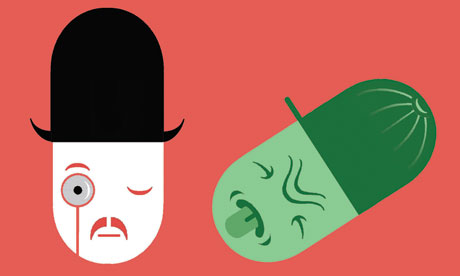The poor die younger and are getting poorer – and we’re happily buying into the propaganda that they somehow deserve it
Tanya Gold
guardian.co.uk, Friday 24 August 2012
Inequality kills – why wouldn’t it? The rich live longer than the poor by seven years on average, the King’s Fund thinktank reported this week – Maleficent arriving with a curse. The thinktank gathered material between 2003 and 2008 and discovered that the Blairite health drive was effective because the middle classes began to limit what it called “risky behaviour”.
However, the uneducated continued to puff, quaff and stuff. In 2003, they were three times as likely to destroy their health as the educated; in 2008 they were five times as likely. So this is a bad news story hiding inside a good one. Health inequality has widened and, as unemployment grows and the cuts slice, it will get worse. The Guardian ran a story about council provision for food banks this week. That was another bad news story hiding inside a good one; food banks are necessary but they are not nutritious.
There was a third story, too, on the solidity of social immobility, which is essentially measured by whether a child moves beyond the income of its parents. The Daily Telegraph reported that working-class children in the US, although courteous and hard-working, are less likely to ask for assistance at school, and thus fall behind. All this was acknowledged in May by the all-party parliamentary group on social mobility, which was, amusingly, partially funded by the Prince’s Trust. (For the health impact of educating princes to a very high standard, see the photographs of Prince Harry naked in the Sun. They seem to prove he does not eat too many waffles, although I suspect he smokes.)
The findings of the all-party group mostly slipped under the news agenda, squashed by the jubilee and other nonsense. They made for grisly reading. MPs concluded that UK social mobility was among the lowest in western Europe, that it had declined in the last 30 years and that the professions (and parliament) are vastly over-populated by the 7% who went to private school.
This inequality is not merely immoral but irrational, because it prevents many talented people fulfilling their potential and thus benefitting the economy (the group estimated the loss to the economy of not reaching international social mobility benchmarks at £150bn, or 4% of GDP). It is deadly. Do we care? Thinktanks report and ministers blather on, orattack the BBC’s economics editor as a distraction. We are at an impasse.
Where is the anger? The British are masters at class denial and what it means; we would rather, it seems, purr over Downton Abbey than actually face the stats. The prime minister, to accusations that a man who has never worried about money cannot responsibly legislate for those who do, says: “It doesn’t matter where you came from, it’s where you’re going that counts.” Is he a train? Does he not know that where you come from determines where you are going?
Labour, meanwhile, is too polite or too frightened of the privilege in its own ranks to attack the Tory frontbench for its cartoonish affluence and state, quite clearly – where is your empathy? National newspapers, largely owned by the very wealthy, don’t help. They confuse the issue by peddling stereotypes and routinely describe those on £80,000 a year as “middle class” (the average wage in Britain, in case they really don’t know, was £26,200 last year).
Trade unions are painted as corrupt (“barons!”), any whisper of ministerial wealth and its consequences is unfair (“class war”) and Labour leaders are either useless (“Wallace”) or mad (“the big clunking fist [of Gordon Brown]”). Welfare claimants, meanwhile, are “scroungers”, as government departments search for unrepresentative case studies to leak and undermine popular support for a welfare state. This propaganda is effective. Class, we are told, is irrelevant: Boris Johnson dancing to the Spice Girls and toffs speaking mockney is the evidence.
Despite the ever-widening gulf between rich and poor, more than 70% now self-identify as middle class and, with unions a dirty word reminiscent only of the 13th century and its miseries (“barons!”) why should we know better?
What to do? The all-party parliamentary group made some suggestions, which should be acted on, but won’t be, particularly if there is no murmur of a public outcry as small children drift from poverty to poverty, and worse. They identify quality of teaching, out-of-school opportunities and, particularly, development for the under 3s, because that “is the point of greatest leverage”. All this is expensive, anathema to the Tory cause and time-consuming; there will be nothing to boast about in time for the next election campaign.
Better to place the blame on the victims? In 2010 the PM said: “The differences in child outcomes between a child born in poverty and a child born in wealth are no longer statistically significant when both have been raised by confident and able parents.” This was a moral framework for his welfare bonfire, and it is simply junk. Even the co-author of the Demos report he drew this conclusion from disputed it; love is excellent and widespread, she said, but it isn’t enough to overpower child poverty as a factor in determining that child’s future. Even so, to say the rich are better at caring for their children buys into the fantasy that wealth is inherently moral, and poverty is immoral. Only the bad die young. That will be the story.
Twitter: @TanyaGold1
See online: Britons are masters at class denial and what it means. Where is the anger?

